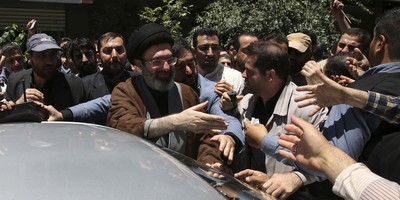Two successful assassinations -- those of al-Awlaki and bin Laden -- have persuaded some that President Obama, whatever his domestic failures, has presided over a successful foreign policy. This is way too generous. In fact (with the exception of targeted assassinations and the surge in Afghanistan), the president seems to conduct foreign policy based on seat-of-the-pants responses to events, rather than relying on any over-arching strategy. And his reactions to such events are more often based upon reversing what he regards as past American sins than on pursuing America's interests in the world.
This first became evident when the Iranian street erupted in 2009. There is no regime in the world that represents a greater threat to the lives of Americans than Iran's. The mullahs have shed more American blood than any entity except al-Qaida (and they have assisted al-Qaida) over the course of the past three decades. Iran constantly plots to damage the U.S. by sponsoring terror groups, allying with American enemies like Hugo Chavez, and supplying and training the Iraqi militias and Taliban, who in turn kill Americans in Iraq and Afghanistan. The fall of the Iranian regime would be the greatest victory imaginable against worldwide terror (to say nothing of what it would do for Iranians). Yet when the regime was rocked by weeks of protests, Obama let the opportunity to support the demonstrators, and possibly affect the outcome, slip through his fingers.
Obama couldn't let go of the idea that his role was to prove to the Iranian leadership that unlike past U.S. leaders, such as the "arrogant" Dwight Eisenhower who intervened in Iran in the 1950s, he respected them and meant them no harm.
Similarly, as the uprising in Syria unfolded over the past six months, the president was passive. Previous administrations regarded Syria, Iran's chief client in the Arab world and another key sponsor of terror, as a hostile power. Obama, whose chief aim was to say goodbye to all that, courted the regime, calling Bashar al-Assad a "reformer." He sent an ambassador, and he did not recall him even when the regime used guns and tanks against unarmed demonstrators. (Ambassador Robert Ford has done the best he could under the circumstances, lending his support to the protesters.)
Recommended
The al-Assad regime has so far killed more than 3,000 Syrians and wounded many more. The "reformer" has also tortured many regime opponents.
Yet the Obama administration has failed to take the kind of steps that might yield an outcome favorable to U.S. interests (or those of the Syrian people). The U.S. has imposed sanctions on the top leadership, but these are wrist slaps and have been completely ineffective.
The contrast with Libya is instructive. Though Qaddafi was a vicious tyrant, he has long since ceased to be a threat to the U.S. Following the Iraq War, he voluntarily relinquished his weapons of mass destruction program and was relatively quiescent on the world stage. Yet when he threatened his own people, Obama proved willing to spend billions in a "war of choice" to help remove him. Something about a "duty to protect." Yet that duty did not apply to Syria or Iran.
Just weeks after discovering that Iran was plotting a massive terror attack in Washington, D.C., Obama not only failed to respond, but handed the Iranians a huge gift in the form of the U.S. withdrawal from Iraq.
Now Obama is embarking on another humanitarian military intervention -- sending 100 U.S. soldiers to track down and destroy the Lord's Resistance Army in central Africa. There is no doubt that the LRA is a particularly nasty piece of work -- an armed militia that engages in kidnapping, rape, murder and torture. It's heartbreaking, but alas, not by any means unique around the globe. What is the rationale for American intervention? Obama explained to Congress that, "I believe that deploying these U.S. armed forces furthers U.S. national security interests and foreign policy." Keeping a stabilizing force in Iraq apparently is not.
The Obama doctrine for intervention would appear then to be: Intervene only where American interests are in no way implicated. But in situations such as those in Iran and Syria, where intervention of some kind would serve American strategic interests as well as humanitarian concerns, hold back.

























Join the conversation as a VIP Member